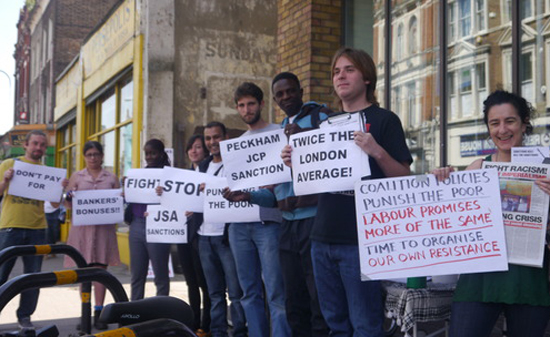
The government’s proposed new and draconian anti-trade union law has horrified the Labour Party as, apart from further limiting rights to strike, the bill contains proposals which will choke off union funding for the party. The aim of the legislation is to place even more shackles on the trade union movement before further savage cuts in public spending and consequent job losses take place. The Tories also aim to take advantage of the total lack of resistance trade unions have offered over the last five years of austerity and leave nothing to chance. Taking advantage of Labour’s disarray and threatening it with bankruptcy is a bonus. Robert Clough reports.
The provisions of the bill include:
- banning strikes in most public services unless first, at least 50% of those participating in the proposed action vote in the ballot, and second, at least 40% of those affected also support the action;
- allowing employers to hire strike-breaking agency staff;
- requiring ballots to be re-run every four months, and setting a minimum two weeks’ notice for any industrial action;
- criminalising unlawful or ‘intimidatory’ picketing rather than treating it as a civil offence, and requiring a union official to oversee such pickets and ensure that they abide by the law, for instance, that no more than six strikers are present;
- limiting the amount of time that lay officials can spend on union business in government departments;
- giving the government trade union certification officer powers to fine unions up to £20,000 for breaches of reporting rules which will include an annual audit of its protests and pickets.
In addition, the Trade Union Bill requires unions to contact each union member directly to ask if they want to pay into the political levy, and to repeat the question every five years. This is a major source of funding for the Labour Party: under the current opt-out arrangements about £25m a year is raised from 4.5 million union members, with much of this money going to the Labour Party. These provisions apply to unaffiliated unions such as the RMT. A requirement to opt in to the political levy is likely to dramatically reduce the number of members paying it.
The four anti-trade union laws of the Thatcher era had two consequences: first, they forced union leaderships to tighten control over the membership to stifle local initiatives which might result in legal action and the possibility of fines and sequestration of union funds. The second followed from the first: days lost through strike action fell to historical lows and have remained there despite the last five years of austerity and job losses. Alongside this, unions lost millions of members, especially manual and poorly-paid workers in the private sector, to the point where they now organise principally among older, better-off professional and managerial workers with relatively secure jobs in the public sector. Now, only one in seven workers in the private sector is a union member. The Trade Union Membership 2014 Statistical Bulletin tells us that:
- 54.3% of public sector workers are union members (down from 61.3% in 1995) compared to 14.2% in the private sector;
- 37.6% of union members are over 50 years old compared to 27.5% of all employees. In 1995, 22.5% of union members were over 50;
- 22% of union members are less than 34 years old compared to 37.8% of all employees. The figures for those under 24 years old are 4.5% and 13.9% respectively;
- 52% of union members have ten or more years’ service compared to 25% of non-union members and 31% of all employees;
- 53.8% of union members have a degree or higher education qualification compared to 38.6% of non-union members and 42.1% of all employees.
These figures are reflected in average pay: 53% of union members earn more than £500 per week compared to 40% of all employees. Taken together with the fact that local white-collar trade union branches tend to be run by lower and middle management there has been pressure for trade unions not to confront austerity but to negotiate voluntary redundancy schemes especially in local government. However, with the government seeking cuts of 40% in government spending apart from the NHS, school education, the armed forces and overseas aid, the next five years will see council services and jobs reduced to a shell. Already councils have lost £18bn or 19% of their budgets since 2010; services have been cut to the bone and hundreds of thousands of jobs lost.
Fighting austerity requires trade unions to confront anti-trade union legislation with all the legal consequences. The government knows this, and is preparing the ground in case local trade union organisations break from the control of their leaderships. Trade union leaders will huff and puff and threaten to defy the law just as they have done with each preceding anti-trade union law while failing to actually do anything. What matters is what action members will be forced to take when the next round of cuts bites.
The things trade union leaders say
‘The trade unions will unite to fight these attacks.’ Mick Cash, RMT general secretary, May 2015, on the proposed anti-trade union law.
‘Regrettably in this case we have been advised that, as the law stands, we would be unable to defend this case.’ Mick Cash, 8 July 2015, reflecting on Manchester rail workers being threatened with legal action if they went on strike.
FRFI 246 August/September2015




